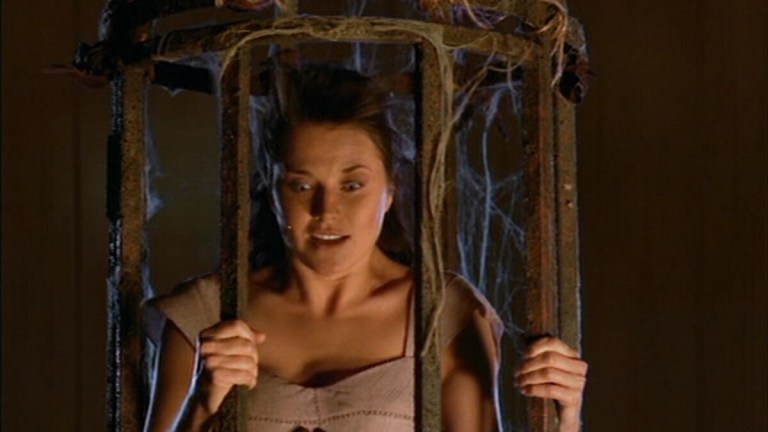That Time Xena Was Directed by Potsie From Happy Days
Xena saw happier days, but was drawn back to the ways of the Warrior Princess in “Remember Nothing.”

In a time of ancient gods, warlords, and kings, a land in turmoil cried out for a hero. But they got a Potsie. Hello sunshine, goodbye rain. Xena: The Warrior Princess, in its second season, was already at the forefront of progressive heroics, and its star Lucy Lawless embodied the power of the feminine mystique. Xena was forged in the heat of battle, with the power, passion, and courage to change the world. And she had many gifts. Anson Williams, who originated the role of Warren “Potsie” Weber on the network TV hit Happy Days, helped wrap a pivotal episode, “Remember Nothing.”
Xena: The Warrior Princess is a spin-off of the television series Hercules: The Legendary Journeys, but Xena and Gabrielle (Renee O’Connor) are no Laverne and Shirley. Xena was a guest character on three episodes of Hercules in an arc which was supposed to leave her dead. But she was too popular to go without a fight. The first season of Xena established it as a rising cult favorite, and by its second season it reached the top slot for weekly syndicated hour long drama. A lot of this had to do with the fact that “Girls Just Wanna Have Fun,” both the name of a series’ favorite, their vampire episode, and the overall enthusiasm of the cast and creative team.
Xena met her son and spared him the weight of her past in the first episode of the second season, “Orphan of War.” The following installment finds her longing for a more innocent time. “Remember Nothing” pays tribute to Frank Capra’s wishfully thinking 1946 Hollywood classic It’s a Wonderful Life, and to bring back the nostalgia, the producers brought on an alumnus of Happy Days to direct. The classic comedy series rode in on the wave of golden goldies retrofits like Grease and Lords of Flatbush to whitewash the era of early rock and roll for mainstream TV. The switchblades of contemporary 1950s films like Blackboard Jungle were replaced by flip-combs, and the worst trash talk you were allowed was to tell someone to “sit on it.”
“I wish I’d never followed the sword in the first place,” Xena says in “Remember Nothing,” and it was Anson Williams’ job to disarm her. The first-time Xena director also directed two 1996 episodes of Hercules: The Legendary Journeys, “Mummy Dearest” and “King for a Day.”
The premise of the episode is interesting. Battle fury causes Xena to kill a young soldier while defending the temple of the Fates. “Name your reward. If it’s ours to bestow, it’s yours,” the Crone promises in gratitude. “Reward,” a guilt-filled Xena asks in shame. “For what? For killing a boy barely out of his childhood? I don’t want a reward; I want that boy’s life back.”
The Three Fates don’t have that power, but instead spin back time. Allowing Xena to choose a warrior path or remain in an alternate reality where her youngest brother is still alive, and she’s engaged to a young man named Maphias (Robert Harte), who is liable to give up on her, “in ten or fifteen years.” Her mother, sadly, she has to forfeit, as she died in the fight which was erased along with the Xena Mythology. She gets to keep the simple village life, unless she takes a life, even for a just cause.
But the original concept was just as tantalizing. “We were kidding around one day, saying, ‘In our fifth season, we’ll have to do the blind amnesia show,’” the episode’s storywriter Steven L. Sears recalled in a January 1998 interview with Starlog Magazine. “But then I thought, ‘How do you do an amnesia show that hasn’t been done? What I came up with was that Xena doesn’t forget who she is, the rest of the world forgets her.” The storyline changed by the time the completed script was written. “Even though I have co-story credit on it, Chris [Manheim] deserves all the credit,” Sears said. “She changed it substantially and did a wonderful job; she found levels there that I didn’t. I was thrilled.”
Like many of the young actors on Happy Days, Williams learned how to angle the cameras. He went on to direct episodes of Star Trek: Voyager, Star Trek: Deep Space Nine, Sabrina the Teenage Witch, Beverly Hills, 90210, Charmed, and The Secret Life of the American Teenager. Before Williams made his prime-time directorial debut on a 1987 episode of L.A. Law, he directed afterschool specials and a TV movie about a pre-teen mayor. He expected a lot from his young talent. Maybe a little too much.
“‘Potsie Weber’ directed [this] episode, and I remember him yelling like crazy at the boy who played my brother, Aaron Devitt, trying to wring a good performance out of him,” Lawless recalled in Robert Weisbrot’s 1998 book The Official Guide to The Xenaverse. “Anson was just ragging on him, trying to get some Methody-type performance out of him, which was ridiculous because the boy was untrained. He had all the raw material and no sort of craft.”
Lyceus, the brother, is central to the arc of the story. The episode begins when Xena and Gabrielle visit a temple of the Fates on the anniversary of his death. Defending the temple is the reason Xena is granted a second chance. Her brother is the beginning and the end of that chance. It’s a lot of pressure for a young actor.
“It happens with young men, usually, that you can only yell at them so long and they come to a little crisis point,” Xena recalled in Weisbrot’s book. “They say, ‘This is ridiculous., this cannot be happening to me.’ And he just started to laugh. And so, I went out the back with Aaron and we talked about acting and I tried to get him to loosen up and have some fun with me and just listen and ‘bring me in.’ And I think he did have more fun but it gave him a terrible shock about acting. He said he’d never do another part without going away to drama school. Yes, Aaron was very much like my [real] brother Daniel.”
“Sometimes I think our actors get nervous working with Lucy because she’s the star,” teleplay writer Chris Manheim told Whoosh! in its February 1999 issue. “Remember Nothing” was her first script as part of the full-time staff. She also felt a connection with the Lyceus character. Manheim wrote scenes for the brother and fiancé to build the characters outside of the main stars’ gravity.
“I thought it filled it out nicely and gave you a shot at seeing who that younger brother of hers was,” Manheim told Whoosh!. “I had lost my own younger brother and that was another thing that made the episode so special to me. It made me real tenacious about hanging on to the fact that this is an enormous, momentous decision for her. She can’t blithely say, ‘Well I’ll sacrifice my brother because I love Gabrielle.’ I just could not, no matter what, make it that cavalier a decision. To me, that was the most important, pivotal moment. She had to understand what she was doing for her brother’s good as well as Gabrielle’s and for the Greater Good under all circumstances.”
Williams may have learned a lot about directing while on the set of Happy Days, but he completely missed the power of the Fonz. The biggest change to Xena’s character is that she’s not wearing leather. She spends the episode in village clothes. It’s like those scenes in the early Happy Days when Fonzie (Henry Winkler) is wearing the tan cloth jacket. Suzi Quatro could have pulled off the warrior princess look if “Leather” Tuscadero reunited the Suedes for a 90s tour. Now, I understand Xena isn’t Hercules, she didn’t go through the entire season in one pair of tattered pants, but still. It should be noted.
Xena: The Warrior Princess has a strong feminist overtone and two strong female leads, but very few of the series’ six season run of 134 episodes were directed by women. While this may not have altered the show’s midriff fetish, it might have been more cinematically revealing. The production had certain rules for shooting in order to maintain serial consistency. Visually, it appears Williams deviated from some of the standard dynamics. While he maintained cameras at eye-level, which was a norm for the show to keep the audience in the heat of battle, some of his action sequences are more ensemble-based than Xena-centric.
Which brings us to Gabrielle. She is not forgotten in “Remember Nothing.” The episode reinforces the preordained nature of the mythic teaming. Regardless of circumstances, timelines or alternative universes, Xena and Gabrielle are bound by fate. The historical displacement leaves Gabrielle as a bitter slave to the abusive warlord Mezentius (Stephen Tozer). Her cynicism is palpable, and she wears world-weariness under her very skin. “I thought Renee was brilliant,” Lawless said in Weisbrot’s book. “I thought she was really great [playing] such an awful little tramp.”
While Xena doesn’t rack up much of a kill-count in the episode. Gabrielle guts her vicious master, getting her first kill of the series. “But in this timeline is it the same Gabrielle?” Sears asked rhetorically during his July 1998 interview with Whoosh!. “It was not just the killing, it was the look on Gabrielle’s face. No second thought about it, this was justice as far as she was concerned.”
The kill ultimately doesn’t count, because this is an alternative reality, and first kills are a big thing on Xena: The Warrior Princess. The jokey disclaimer tagged on at the end of the credits promised “Xena’s memory was not damaged or ….. what was I saying?” But there was no collateral fallout. “Remember Nothing” was filmed from May 8 through May 16, 1996. It aired on Oct. 7, 1996, to an appreciative audience which recalls it quite fondly.

